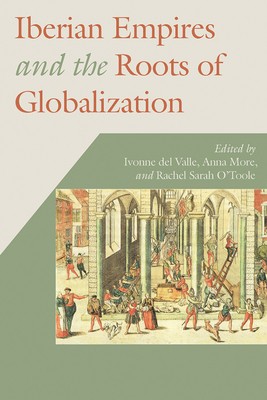
- We will send in 10–14 business days.
- Publisher: Vanderbilt University Press
- ISBN-10: 0826522521
- ISBN-13: 9780826522528
- Format: 15.2 x 22.9 x 2.4 cm, kieti viršeliai
- Language: English
- SAVE -10% with code: EXTRA
Iberian Empires and the Roots of Globalization (e-book) (used book) | bookbook.eu
Reviews
Description
Through interdisciplinary essays covering the wide geography of the Spanish and Portuguese empires, Iberian Empires and the Roots of Globalization investigates the diverse networks and multiple centers of early modern globalization that emerged in conjunction with Iberian imperialism.
Iberian Empires and the Roots of Globalization argues that Iberian empires cannot be viewed apart from early modern globalization. From research sites throughout the early modern Spanish and Portuguese territories and from distinct disciplinary approaches, the essays collected in this volume investigate the economic mechanisms, administrative hierarchies, and art forms that linked the early modern Americas, Africa, Asia, and Europe. Iberian Empires and the Roots of Globalization demonstrates that early globalization was structured through diverse networks and their mutual and conflictive interactions within overarching imperial projects. To this end, the essays explore how specific products, texts, and people bridged ideas and institutions to produce multiple centers within Iberian imperial geographies. Taken as a whole, the authors also argue that despite attempts to reproduce European models, early Iberian globalization depended on indigenous agency and the agency of people of African descent, which often undermined or changed these models. The volume thus relays a nuanced theory of early modern globalization: the essays outline the Iberian imperial models that provided templates for future global designs and simultaneously detail the negotiated and conflictive forms of local interactions that characterized that early globalization. The essays here offer essential insights into historical continuities in regions colonized by Spanish and Portuguese monarchies.EXTRA 10 % discount with code: EXTRA
The promotion ends in 22d.23:46:25
The discount code is valid when purchasing from 10 €. Discounts do not stack.
- Publisher: Vanderbilt University Press
- ISBN-10: 0826522521
- ISBN-13: 9780826522528
- Format: 15.2 x 22.9 x 2.4 cm, kieti viršeliai
- Language: English English
Through interdisciplinary essays covering the wide geography of the Spanish and Portuguese empires, Iberian Empires and the Roots of Globalization investigates the diverse networks and multiple centers of early modern globalization that emerged in conjunction with Iberian imperialism.
Iberian Empires and the Roots of Globalization argues that Iberian empires cannot be viewed apart from early modern globalization. From research sites throughout the early modern Spanish and Portuguese territories and from distinct disciplinary approaches, the essays collected in this volume investigate the economic mechanisms, administrative hierarchies, and art forms that linked the early modern Americas, Africa, Asia, and Europe. Iberian Empires and the Roots of Globalization demonstrates that early globalization was structured through diverse networks and their mutual and conflictive interactions within overarching imperial projects. To this end, the essays explore how specific products, texts, and people bridged ideas and institutions to produce multiple centers within Iberian imperial geographies. Taken as a whole, the authors also argue that despite attempts to reproduce European models, early Iberian globalization depended on indigenous agency and the agency of people of African descent, which often undermined or changed these models. The volume thus relays a nuanced theory of early modern globalization: the essays outline the Iberian imperial models that provided templates for future global designs and simultaneously detail the negotiated and conflictive forms of local interactions that characterized that early globalization. The essays here offer essential insights into historical continuities in regions colonized by Spanish and Portuguese monarchies.

Reviews